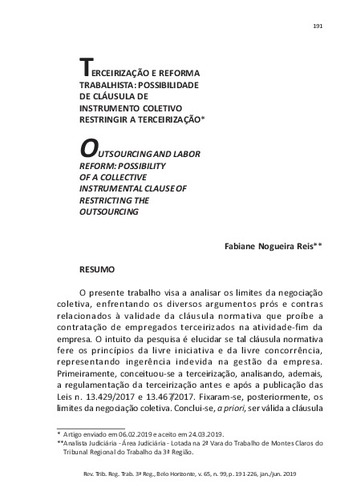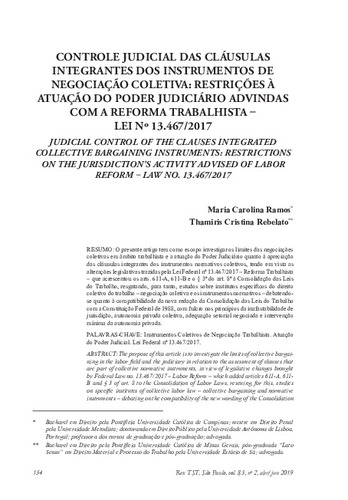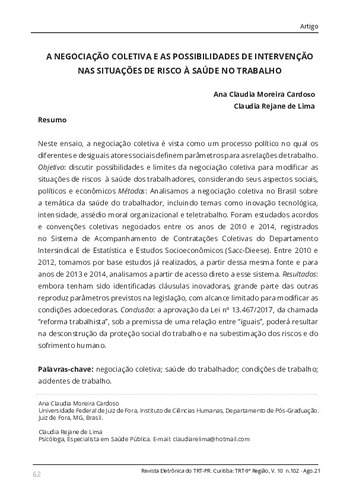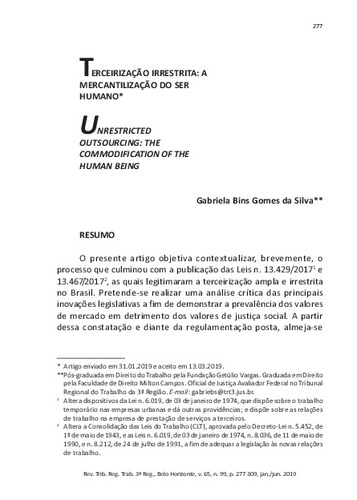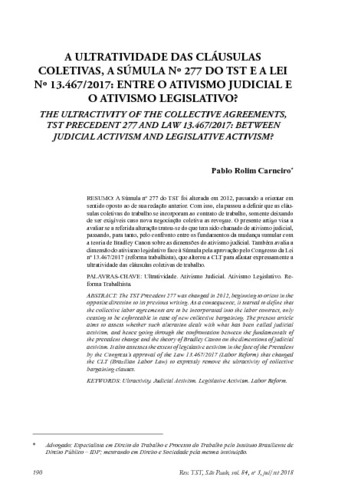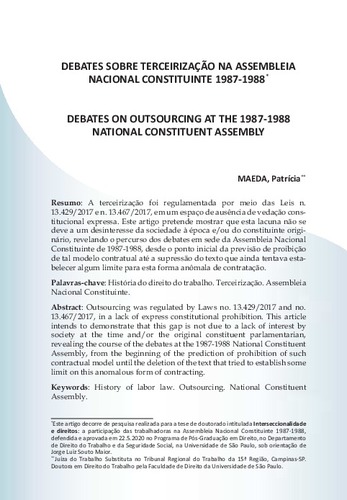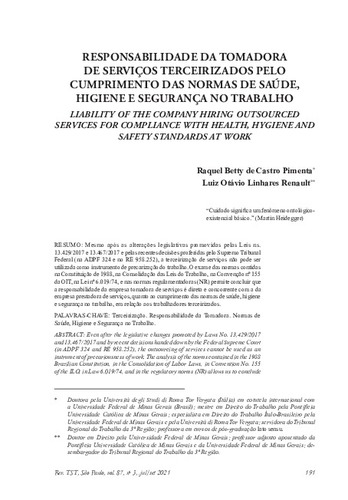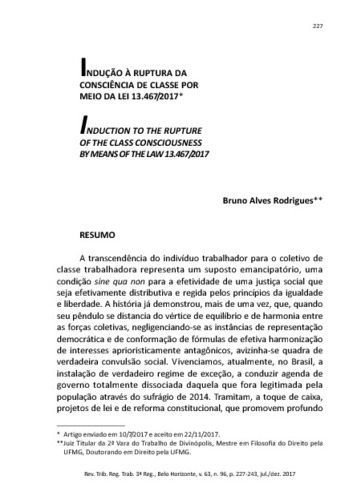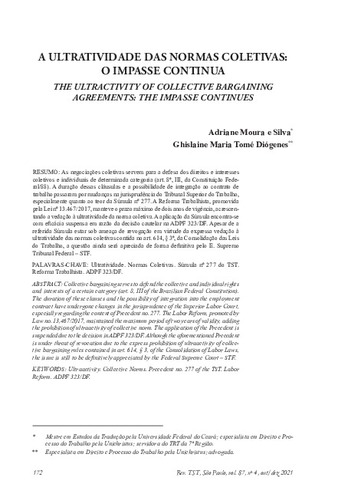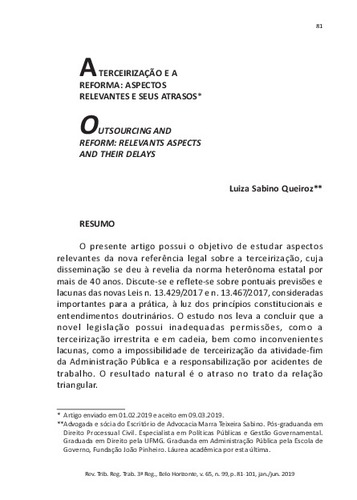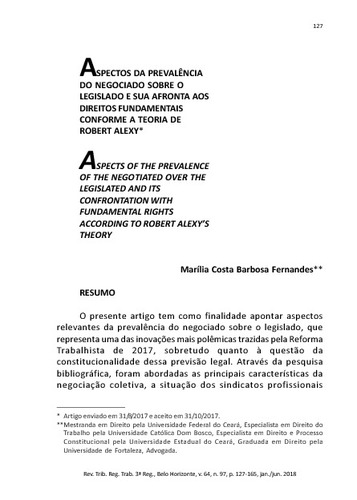Artigo de periódico
Terceirização e reforma trabalhista: possibilidade de cláusula de instrumento coletivo restringir a terceirização
| dc.contributor.author | Reis, Fabiane Nogueira | |
| dc.date.accessioned | 2019-09-30T19:40:22Z | |
| dc.date.available | 2019-09-30T19:40:22Z | |
| dc.date.issued | 2019-06 | |
| dc.identifier.citation | REIS, Fabiane Nogueira. Terceirização e reforma trabalhista: possibilidade de cláusula de instrumento coletivo restringir a terceirização = Outsourcing and labor reform: possibility of a collective instrumental clause of restricting the outsourcing. Revista do Tribunal Regional do Trabalho da 3ª Região, Belo Horizonte, v. 65, n. 99, p. 191-226, jan./jun. 2019. | pt_BR |
| dc.identifier.uri | https://hdl.handle.net/20.500.12178/162550 | |
| dc.description.abstract | [por] Analisa os limites da negociação coletiva, enfrentando os diversos argumentos prós e contras relacionados à validade da cláusula normativa que proíbe a contratação de empregados terceirizados na atividade-fim da empresa. O intuito da pesquisa é elucidar se tal cláusula normativa fere os princípios da livre iniciativa e da livre concorrência, representando ingerência indevida na gestão da empresa. Primeiramente, conceituou-se a terceirização, analisando, ademais, a regulamentação da terceirização antes e após a publicação das Leis n. 13.429/2017 e 13.467/2017. Fixaram-se, posteriormente, os limites da negociação coletiva. Conclui-se, a priori, ser válida a cláusula normativa que proíbe a contratação de empregados terceirizados, na medida em que, a despeito de o ordenamento permitir a terceirização, inclusive na atividade-fim, é lícito às partes optarem por não realizar esse tipo de contratação. No mais, tal cláusula não afronta nenhum preceito da ordem jurídica, e o seu objeto não ultrapassa os limites estabelecidos para a autocomposição pelas partes, possibilitando, além disso, que a negociação coletiva seja utilizada como instrumento de proteção aos trabalhadores. O trabalho adota o método dedutivo, realizado a partir de pesquisa bibliográfica, levantamento de doutrina e artigos em periódicos sobre o tema, aliado à análise da jurisprudência e legislação pátria. | pt_BR |
| dc.description.abstract | [eng] This study aims to analyze the limits of collective bargaining, facing the various pros and cons arguments related to the validity of the normative clause that prohibits the hiring of outsourced employees in the core business of the company. The purpose of the research is to elucidate whether this normative clause violates the principles of free enterprise and free competition, representing undue interference in the management of the company. First, outsourcing was conceptualized, then in addition the outsourcing regulation was analyzed before and after the publication of Laws 13.429/2017 and 13.467/2017. The limits of collective bargaining were subsequently set. It is concluded that, a priori, the normative clause prohibiting the hiring of outsourced employees is valid since, in spite of the fact that the arrangement allows outsourcing, included in the core business, it is legal for the parties to choose not to perform this type of contracting process. Moreover, such clause does not address any limits of the legal order and its object does not exceed the limits established for self-composition by the parties, in addition enabling collective bargaining to be used as an instrument to protect workers. | pt_BR |
| dc.description.tableofcontents | Regulamentação da terceirização antes das Leis n. 13.429/2017 e 13.467/2017 -- Principais alterações trazidas pelas Leis n. 13.429/2017 e 13.467/2017 à terceirização -- Limites à negociação coletiva e prevalência do negociado sobre o legislado -- Análise da possibilidade de cláusula de instrumento coletivo restringir a terceirização | pt_BR |
| dc.language.iso | pt_BR | pt_BR |
| dc.relation | Brasil. Lei da terceirização (2017) | pt_BR |
| dc.relation | Brasil. Lei n. 13.467, de 13 de julho de 2017 | pt_BR |
| dc.relation | Brasil. Lei n. 6.019, de 3 de janeiro de 1974 | pt_BR |
| dc.relation.ispartof | Revista do Tribunal Regional do Trabalho da 3ª Região: vol. 65, n. 99 (jan./jun. 2019) | pt_BR |
| dc.relation.uri | https://www.lexml.gov.br/urn/urn:lex:br:federal:lei:2017-03-31;13429 | pt_BR |
| dc.relation.uri | https://www.lexml.gov.br/urn/urn:lex:br:federal:lei:2017-07-13;13467 | pt_BR |
| dc.relation.uri | https://www.lexml.gov.br/urn/urn:lex:br:federal:lei:1974-01-03;6019 | pt_BR |
| dc.subject | Terceirização, Brasil | pt_BR |
| dc.subject | Negociação coletiva de trabalho, Brasil | pt_BR |
| dc.subject | Terceirização, legislação, Brasil | pt_BR |
| dc.subject | Terceirização, jurisprudência, Brasil | pt_BR |
| dc.title | Terceirização e reforma trabalhista: possibilidade de cláusula de instrumento coletivo restringir a terceirização | pt_BR |
| dc.title.alternative | Outsourcing and labor reform: possibility of a collective instrumental clause of restricting the outsourcing | pt_BR |
| dc.type.genre | Artigo de periódico | pt_BR |
| dc.identifier.rvbisys | 1157505 | |
| dc.relation.ispartoflink | https://hdl.handle.net/20.500.12178/162434 | pt_BR |
Coleção
-
Artigos9245


